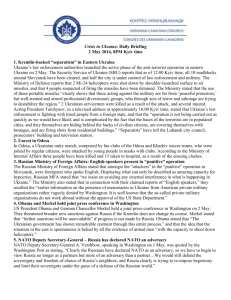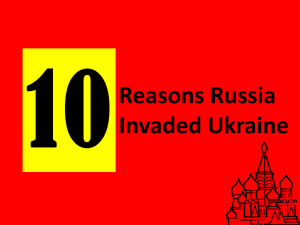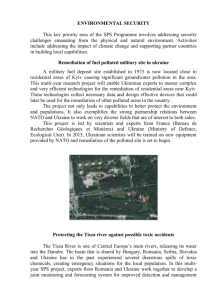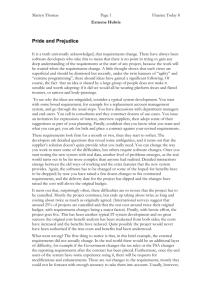Stephen Walt on Foreign Policy lessons
advertisement
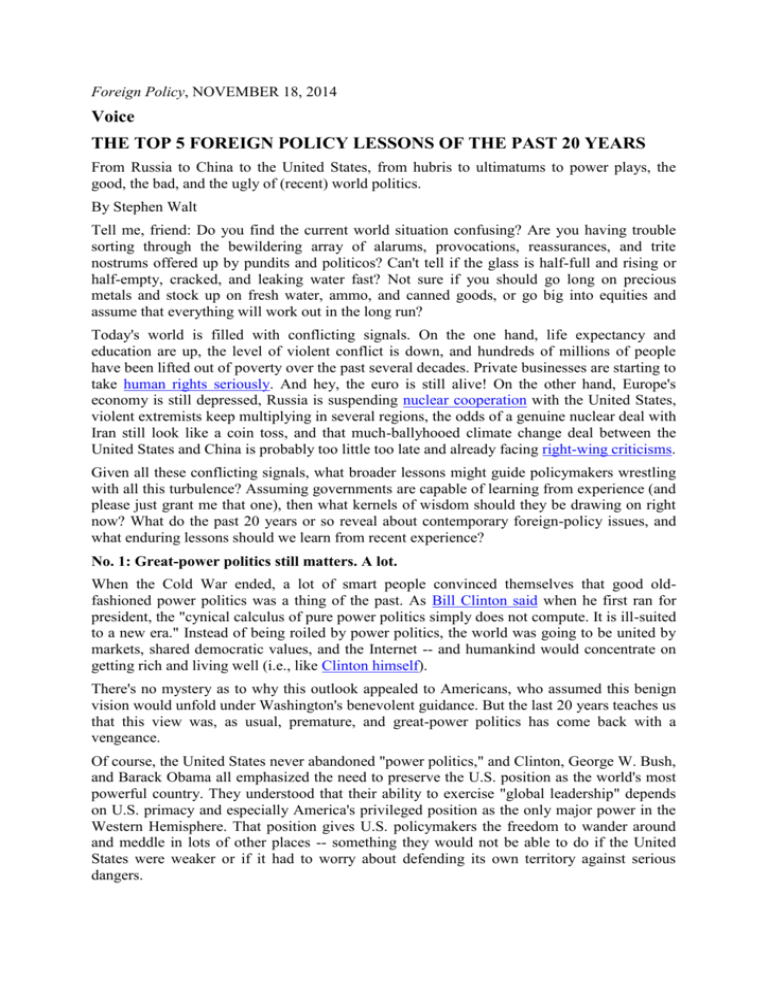
Foreign Policy, NOVEMBER 18, 2014 Voice THE TOP 5 FOREIGN POLICY LESSONS OF THE PAST 20 YEARS From Russia to China to the United States, from hubris to ultimatums to power plays, the good, the bad, and the ugly of (recent) world politics. By Stephen Walt Tell me, friend: Do you find the current world situation confusing? Are you having trouble sorting through the bewildering array of alarums, provocations, reassurances, and trite nostrums offered up by pundits and politicos? Can't tell if the glass is half-full and rising or half-empty, cracked, and leaking water fast? Not sure if you should go long on precious metals and stock up on fresh water, ammo, and canned goods, or go big into equities and assume that everything will work out in the long run? Today's world is filled with conflicting signals. On the one hand, life expectancy and education are up, the level of violent conflict is down, and hundreds of millions of people have been lifted out of poverty over the past several decades. Private businesses are starting to take human rights seriously. And hey, the euro is still alive! On the other hand, Europe's economy is still depressed, Russia is suspending nuclear cooperation with the United States, violent extremists keep multiplying in several regions, the odds of a genuine nuclear deal with Iran still look like a coin toss, and that much-ballyhooed climate change deal between the United States and China is probably too little too late and already facing right-wing criticisms. Given all these conflicting signals, what broader lessons might guide policymakers wrestling with all this turbulence? Assuming governments are capable of learning from experience (and please just grant me that one), then what kernels of wisdom should they be drawing on right now? What do the past 20 years or so reveal about contemporary foreign-policy issues, and what enduring lessons should we learn from recent experience? No. 1: Great-power politics still matters. A lot. When the Cold War ended, a lot of smart people convinced themselves that good oldfashioned power politics was a thing of the past. As Bill Clinton said when he first ran for president, the "cynical calculus of pure power politics simply does not compute. It is ill-suited to a new era." Instead of being roiled by power politics, the world was going to be united by markets, shared democratic values, and the Internet -- and humankind would concentrate on getting rich and living well (i.e., like Clinton himself). There's no mystery as to why this outlook appealed to Americans, who assumed this benign vision would unfold under Washington's benevolent guidance. But the last 20 years teaches us that this view was, as usual, premature, and great-power politics has come back with a vengeance. Of course, the United States never abandoned "power politics," and Clinton, George W. Bush, and Barack Obama all emphasized the need to preserve the U.S. position as the world's most powerful country. They understood that their ability to exercise "global leadership" depends on U.S. primacy and especially America's privileged position as the only major power in the Western Hemisphere. That position gives U.S. policymakers the freedom to wander around and meddle in lots of other places -- something they would not be able to do if the United States were weaker or if it had to worry about defending its own territory against serious dangers. But the United States isn't alone. China's increasingly assertive policies toward its immediate neighborhood shows that Beijing is hardly indifferent to geopolitics, and Russia's assertive defense of what it sees as vital interests in its "near abroad" (e.g., Ukraine) suggests that somebody in Moscow didn't get the memo about the benign effects of globalization. And regional powers like India, Turkey, and Japan are taking traditional geopolitical concerns more seriously these days. Bottom line: If you thought great-power rivalry was a thing of the past, think again. No. 2: A lot of global politics is (still) local. A related element of the initial post-Cold War optimism was the idea that the world was gradually being united by globalization and that societies with very different values and histories would gradually converge on a set of similar institutional forms (i.e., some form of market-driven democracy). Identity politics would be handled within representative institutions, and the big political questions would be mostly global in nature (e.g., trade and investment regimes, labor standards, human rights norms, arms control, macroeconomic management, etc.). Messy local issues like minority rights or border disputes would gradually disappear from the global policy agenda and we'd all converge into one big and mostly happy global family. But surprise, surprise: Local identities and issues keep reasserting themselves. Israelis and Palestinians still fight over who gets to pray where in Jerusalem. Catalans, Kurds, and Scots clamor for independence. Minorities in Myanmar, China, Russia, India, and sub-Saharan Africa face violent discrimination. Outside efforts to create a centralized state in Afghanistan and to build effective governments in Iraq and Libya founder over ethnic, sectarian, or tribal divisions. And opposition to outside interference in distant lands inspires both local and transnational terrorism. America's melting-pot mythology tends to blind U.S. leaders to the enduring power of these local identities, because Americans tend to view such affinities as pre-modern traits that will get discarded once education, markets, democracy, and modernity take hold. America's melting-pot mythology tends to blind U.S. leaders to the enduring power of these local identities, because Americans tend to view such affinities as pre-modern traits that will get discarded once education, markets, democracy, and modernity take hold. But the past 20 years suggest that this view is dangerously naive, and any foreign-policy initiative that doesn't take local identities and conditions into account is likely to fail. No. 3: The only thing worse than a bad state is no state. U.S. foreign-policy elites routinely blame foreign-policy problems on the supposedly evil or illegitimate nature of other governments. In this view, international politics isn't a clash of competing interests; it is a morality play between good states -- America and its allies -- and bad states, or anyone who disagrees with us. During the Cold War, the problem was revolutionary communism led by the evil Soviet empire. After the Cold War, the United States blamed trouble on various "rogue" states such as Iraq, Iran, Libya, Syria, North Korea, and Serbia. These states were bad because they were dictatorships and had poor human rights records, revisionist aims, and, in most cases, an appetite for weapons of mass destruction. The obvious solution to the rogue-state problem, of course, was regime change: get rid of these very bad rulers and create governments that treat their own populations better and cooperate with the United States. But as the sorry results of regime change in Libya and Iraq suggest, getting rid of really awful leaders isn't an improvement if the result is anarchy or a weak, corrupt, and highly divisive regime. One might add Yemen and Somalia to the list as well, and that's where Afghanistan is likely to be once the international community stops propping it up. Creating effective governments in post-totalitarian societies turns out to be very, very hard, and especially after a violent overthrow. It is even harder when the society in question is divided and relatively poor, and the lack of any legitimate or effective authority creates power vacuums in which the worst sorts of extremism can flourish. What's the lesson for all you unrepentant regimechangers out there? Be careful what you wish for. No. 4: "Take it or leave it" is bad diplomacy. Over the past 20 years, the United States has also shown a regrettable tendency to issue demands and make threats but not to engage in genuine diplomacy, which is properly understood as the mutual adjustment of competing interests for mutual benefit. Because they saw their opponents as evil and believed the United States held most if not all of the high cards, Americans tended to view any concessions on their part as a form of surrender, even if they ended up getting much of what they wanted. Instead of real bargaining, the United States tended to tell others what it wanted them to do and then ramped up the pressure if they didn't comply. This take-it-or-leave-it approach produced a war over Kosovo in 1999, and it also took us from zero Iranian centrifuges in 2000 to over 11,000 operating today. It also appears to be driving the Western response to Ukraine: The basic EU/United States/NATO position is that Russia should cease all of its activities in Ukraine, withdraw from Crimea, and let Ukraine join the EU and/or NATO if it ever meets the membership requirements. In other words, we are asking Moscow to completely abandon every single one of its own interests in Ukraine, full stop. That outcome might be highly desirable in the abstract, but given Russia's history, its proximity to Ukraine, and its own long-term security concerns, it is hard to imagine Russian President Vladimir Putin capitulating to the West's demands without a long and costly struggle that will do enormous damage to Ukraine itself. Like that infamous village in Vietnam, both sides appear to be prepared to destroy Ukraine in order to save it. Of course, the United States isn't the only country that has adopted this approach to key diplomatic issues. China seems uninterested in genuine diplomacy over the South China Sea, and Benjamin Netanyahu's government in Israel has made it clear that it is willing to negotiate with the Palestinians only if the talks never lead to an agreement or if the Palestinians formally abandon the creation of a viable state of their own. Unfortunately, diplomacy conducted primarily through threats, ultimatums, and a steadfast reluctance to compromise rarely produces successful or durable outcomes. Unfortunately, diplomacy conducted primarily through threats, ultimatums, and a steadfast reluctance to compromise rarely produces successful or durable outcomes. First, even much weaker parties usually have some residual bargaining power, which means that even the most powerful states will have trouble getting absolutely everything they want. Second, when the weaker side is forced to capitulate under duress, it ends up being resentful and will look for opportunities to reopen the issue when conditions are more favorable. To make diplomacy work, you have to give the other side enough of what it wants so that it has an interest in abiding by the deal over the long term. Finally, failure to negotiate with appropriate flexibility also allows problems to fester and deepen, which often makes it harder to resolve the problem later on. No. 5: Beware hubris. The ancient Greeks warned about hubris -- that fatal combination of arrogance or overconfidence that leads foolish mortals to challenge the gods -- and we've seen ample reminders of its pernicious consequences ever since. It was hubris that drove the United States to expand NATO with scant regard for its long-term consequences. It was hubris that has led U.S. diplomats to think their personal charm and powers of persuasion were sufficient to produce a two-state solution in the Middle East. Hubris took George W. Bush into Iraq, and hubris convinced European leaders to create a common currency despite ample warnings that the institutional requirements for a currency union were missing. Hubris lay behind then Prime Minister Recep Tayyip Erdogan's grandiose hopes that Turkey would become the linchpin of a new Middle East order while having "zero problems" in foreign policy. There was even a hint of it in Obama's belief that he could overcome intractable problems with a single well-delivered speech. It remains to be seen whether Putin has overreached in Ukraine, but if it ends in disaster for Russia, hubris will have played a role there too. There's an enduring lesson here. In a world with no central authority and many independent if unequal centers of power, the realm of foreign policy remains one where competition is endemic and where even the strongest of actors find it hard to impose their will at little or no cost. It remains a realm where chance and contingency loom large and where grandiose schemes and ambitious crusades usually fail. Like with mutual funds, past success is no guarantee of future performance, and countries riding high at one moment can find themselves in serious trouble without much warning. The post-Cold War era proves this beyond all doubt: If the mighty United States could stumble with such relentless frequency, that was surely a reminder that statecraft should start with realistic goals and with an eye toward possible pitfalls. And if they are smart, prudent leaders will always have a Plan B at the ready. That's my list of top five lessons. What's yours? http://www.foreignpolicy.com/articles/2014/11/18/top_5_foreign_policy_lessons_of_the_past _20_years%20?utm_source=Sailthru&utm_medium=email&utm_term=*Editors%20Picks&u tm_campaign=2014_EditorsPicks18%2F11RS

